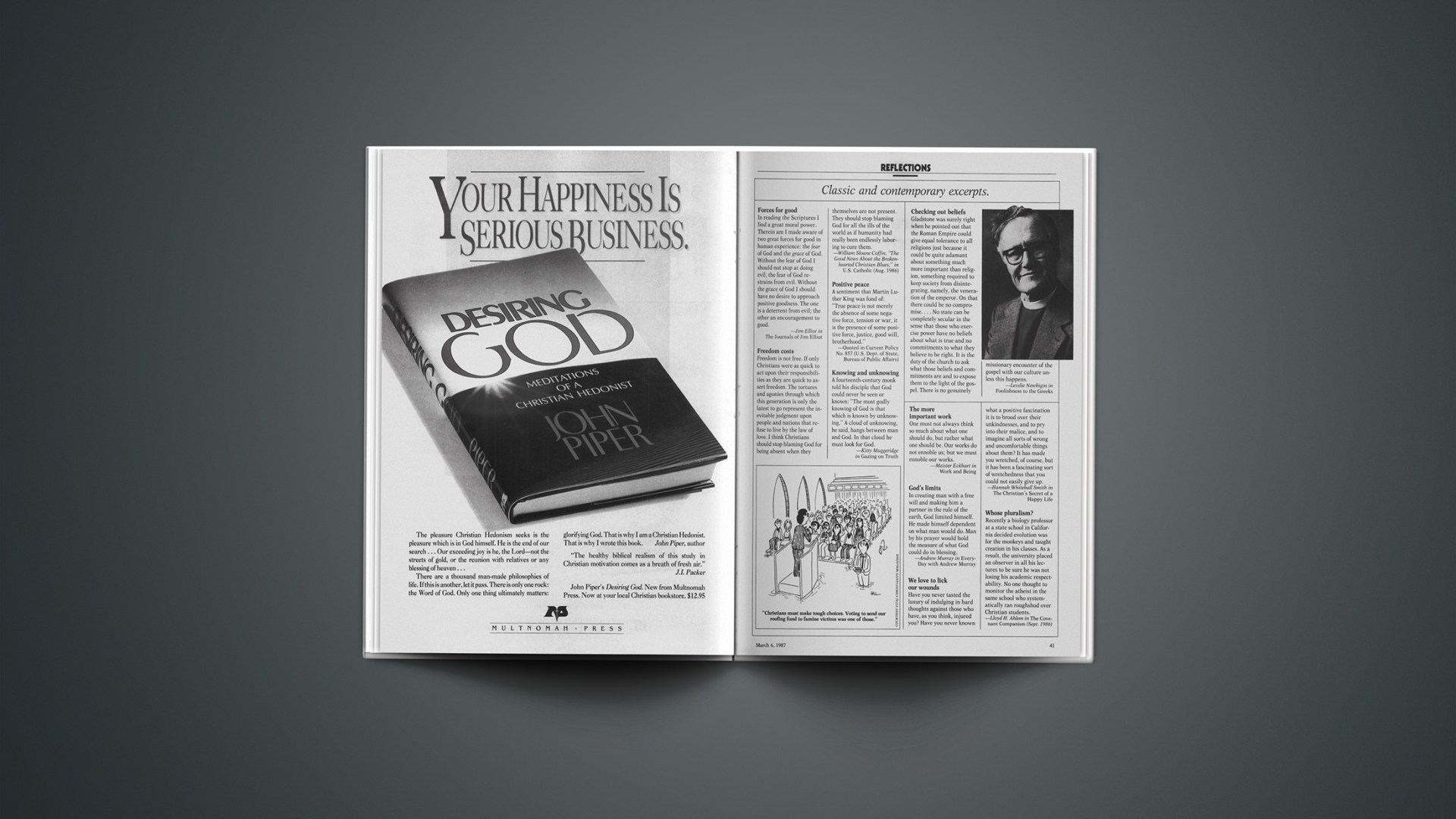Forces for good
In reading the Scriptures I find a great moral power. Therein am I made aware of two great forces for good in human experience: the fear of God and the grace of God. Without the fear of God I should not stop at doing evil; the fear of God restrains from evil. Without the grace of God I should have no desire to approach positive goodness. The one is a deterrent from evil; the other an encouragement to good.
—Jim Elliot in
The Journals of Jim Elliot
Freedom costs
Freedom is not free. If only Christians were as quick to act upon their responsibilities as they are quick to assert freedom. The tortures and agonies through which this generation is only the latest to go represent the inevitable judgment upon people and nations that refuse to live by the law of love. I think Christians should stop blaming God for being absent when they themselves are not present. They should stop blaming God for all the ills of the world as if humanity had really been endlessly laboring to cure them.
—William Sloane Coffin, “The Good News About the Brokenhearted Christian Blues,” in U.S. Catholic (Aug. 1986)
Positive peace
A sentiment that Martin Luther King was fond of:
“True peace is not merely the absence of some negative force, tension or war, it is the presence of some positive force, justice, good will, brotherhood.”
—Quoted in Current Policy
No. 857 (U.S. Dept. of State,
Bureau of Public Affairs)
Knowing and unknowing
A fourteenth-century monk told his disciple that God could never be seen or known: “The most godly knowing of God is that which is known by unknowing.” A cloud of unknowing, he said, hangs between man and God. In that cloud he must look for God.
—Kitty Muggeridge
in Gazing on Truth
Checking out beliefs
Gladstone was surely right when he pointed out that the Roman Empire could give equal tolerance to all religions just because it could be quite adamant about something much more important than religion, something required to keep society from disintegrating, namely, the veneration of the emperor. On that there could be no compromise.… No state can be completely secular in the sense that those who exercise power have no beliefs about what is true and no commitments to what they believe to be right. It is the duty of the church to ask what those beliefs and commitments are and to expose them to the light of the gospel. There is no genuinely missionary encounter of the gospel with our culture unless this happens.
—Lesslie Newbigin in
Foolishness to the Greeks
The more important work
One must not always think so much about what one should do, but rather what one should be. Our works do not ennoble us; but we must ennoble our works.
—Meister Eckhart in Work and Being
God’s limits
In creating man with a free will and making him a partner in the rule of the earth, God limited himself. He made himself dependent on what man would do. Man by his prayer would hold the measure of what God could do in blessing.
—Andrew Murray in Every-Day with Andrew Murray
We love to lick our wounds
Have you never tasted the luxury of indulging in hard thoughts against those who have, as you think, injured you? Have you never known what a positive fascination it is to brood over their unkindnesses, and to pry into their malice, and to imagine all sorts of wrong and uncomfortable things about them? It has made you wretched, of course, but it has been a fascinating sort of wretchedness that you could not easily give up.
—Hannah Whitehall Smith in
The Christian’s Secret of a
Happy Life
Whose pluralism?
Recently a biology professor at a state school in California decided evolution was for the monkeys and taught creation in his classes. As a result, the university placed an observer in all his lectures to be sure he was not losing his academic respectability. No one thought to monitor the atheist in the same school who systematically ran roughshod over Christian students.
—Lloyd H. Ahlem in The Covenant Companion (Sept. 1986)










